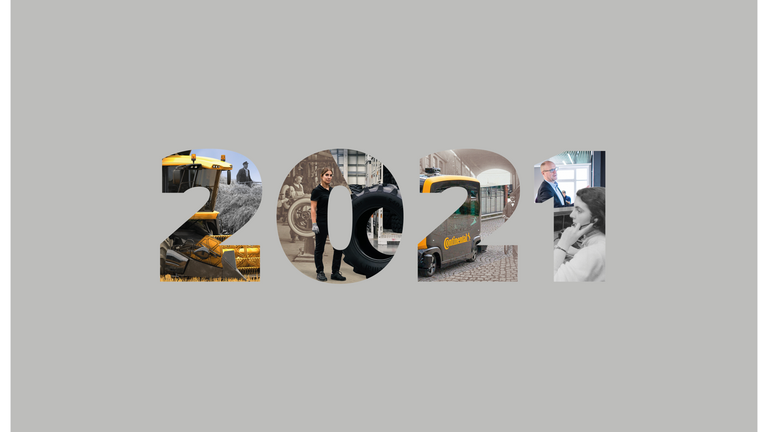Strong Tire Business in the Second Quarter: Continental Achieves Respectable Result
- Consolidated sales of €9.9 billion (Q2 2020: €6.6 billion, +49.7 percent);
organic growth of 55.3 percent - Adjusted EBIT of €711 million (Q2 2020: -€635 million, up €1.3 billion)
- Adjusted EBIT margin of 7.2 percent (Q2 2020: -9.8 percent)
- Net income of €545 million (Q2 2020: -€741 million, up €1.3 billion)
- Free cash flow before acquisitions, divestments and carve-out effects:
€327 million (Q2 2020: -€1.8 billion, up €2.2 billion) - Outlook for fiscal 2021 without Vitesco Technologies: consolidated sales of around €33.5 billion to €34.5 billion; adjusted EBIT margin of around 6.5 to 7.0 percent
- CEO Nikolai Setzer: “After an already subdued start to the year, the ongoing shortage of semiconductors severely slowed automotive production in the second quarter, as expected”
- Order volume for display solutions in the meantime at around €5 billion
- Six of the ten highest-volume manufacturers of electric vehicles rely on Continental tires in the original-equipment sector
- From 2022, Continental intends to enable the use of recycled PET bottles in tire production
Hanover, August 5, 2021. In view of the ongoing macroeconomic challenges, Continental achieved a respectable result in the second quarter of 2021. While business in the Automotive Technologies group sector was affected by the continuing shortages of electronic components, the Rubber Technologies group sector reported strong figures, thanks in particular to the positive performance of the tire business.
“After an already subdued start to the year, the ongoing shortage of semiconductors severely slowed automotive production in the second quarter, as expected. The chip bottleneck and rising raw material prices are set to weigh on the automotive industry throughout 2021,” said Nikolai Setzer, Continental CEO, when presenting the company’s quarterly figures on Thursday, adding: “In the Rubber Technologies group sector, we continued to build on the positive performance of the first three months of the fiscal year in the second quarter. Despite the increasing challenges posed by rising raw material prices, we had a strong first half of the year overall. In the Automotive Technologies group sector, meanwhile, the burden of the chip bottleneck is clearly being felt. At the same time, major orders for key technologies such as large-scale vehicle displays illustrate the growing demand for our increasingly digitalized technologies.”
Consolidated sales totaled €9.9 billion in the second quarter of 2021, well above the previous year’s level, which was impacted by the economic consequences of the first lockdown due to the coronavirus pandemic (Q2 2020: €6.6 billion, +49.7 percent). Before changes in the scope of consolidation and exchange-rate effects, sales rose by 55.3 percent. Compared with the weak prior-year quarter, adjusted EBIT increased to €711 million (Q2 2020: -635 million, up €1.3 billion). This resulted in an adjusted EBIT margin of 7.2 percent (Q2 2020: -9.8 percent). Net income totaled €545 million (Q2 2020: -€741 million). In the second quarter, free cash flowbefore acquisitions, divestments and carve-out effects was €327 million (Q2 2020: -€1.8 billion).
“After the historically weak prior-year period, we achieved a respectable result in the past quarter despite the persistently challenging market environment. The high level of free cash flow is mainly explained by the lower level of capital expenditure between the months of April and June. For the year as a whole, however, we plan to maintain a capital expenditure ratio of 7 percent,” said Wolfgang Schäfer, Continental’s CFO. In the second quarter, the capital expenditure ratio amounted to 4.6 percent.
Market developments: significant regional differences
There were once again significant regional differences in the development of automotive markets between April and June 2021. According to preliminary figures, global automotive production overall was down 8.9 percent to 18.8 million units, considerably lower than in the first quarter of this year (20.6 million units). Due to the worsening supply shortages of semiconductors, production figures declined significantly by 11.5 percent to 3.2 million units in North America and by 12.0 percent to 4.1 million units in Europe compared to the first quarter of 2021. Only in China were production figures roughly on par with the first quarter of 2021, totaling 5.8 million units (+0.1 percent).
Market outlook and forecast for fiscal 2021
Market developments will continue to be characterized by high volatility in the coming months. The shortages of semiconductors will have a noticeable effect on automotive production. After a production output of 74.6 million passenger cars and light commercial vehicles last year, Continental expects an increase of between 8 and 10 percent for the year as a whole (previously 9 to 12 percent).
Continental is adjusting its outlook for the full year for continuing operations, thus excluding Vitesco Technologies. Continental expects consolidated sales of around €33.5 billion to €34.5 billion (previously €32.5 billion to €34.5 billion) and an
adjusted EBIT margin of around 6.5 to 7.0 percent (previously 6 to 7 percent).
For the continuing operations of Automotive Technologies, Continental expects sales of around €16.0 billion to €16.5 billion (previously €16 billion to €17 billion) and an adjusted EBIT margin in the range of around 0.5 to 1.0 percent (previously 1 to 2 percent). As has mostly been announced already, this includes higher extra freight costs of around €200 million as well as additional research and development expenses in the growth field of assisted and automated driving, which now total around €150 million to €200 million. The updated forecast for the adjusted EBIT margin results primarily from accounting-related one-off effects from the planned spin-off of Vitesco Technologies totaling around €80 million. Although this impacts the adjusted margin of Automotive Technologies, it does not have any effect on the net income.
Sales in the Rubber Technologies group sector are now expected to be around €17.2 billion to €17.8 billion (previously €16.5 billion to €17.5 billion), with an adjusted EBIT margin of around 12.5 to 13.0 percent (previously 11.5 to 12.5 percent). This includes the impact expected from higher raw material costs of around €500 million (previously €350 million), which mainly relate to synthetic and natural rubber.
After the spin-off of Vitesco Technologies has been completed, contract manufacturing will also be reported as a new group sector of Continental under the name of Contract Manufacturing. Currently, 21 production sites still manufacture products of Vitesco Technologies as well as products of Continental. This makes it necessary for Continental companies to manufacture products for Vitesco Technologies by way of contract manufacturing and vice versa. This contract manufacturing is not intended to be a permanent situation, and the volumes are to be reduced continuously in the coming years. For the new Contract Manufacturing group sector, sales of around €250 million and an adjusted EBIT margin of around 2 to 3 percent are expected.
Free cash flow before acquisitions, divestments and carve-out effects is still expected to be around €1.1 billion to €1.5 billion for continuing operations.
Development of the group sectors
Sales in the Automotive Technologies group sector increased in the second quarter by 47.8 percent to €3.8 billion (Q2 2020: €2.6 billion). The adjusted EBIT margin came to -1.6 percent (Q2 2020: -19.0 percent), and organic growth came to 57.4 percent. The worsening supply situation for semiconductors as well as the resulting lower sales figures and higher expenses for freight costs put pressure on sales and earnings. The increased freight costs amounted to around €60 million in the second quarter (and around €110 million for the first half of 2021).
Irrespective of this, Continental demonstrated its technological expertise and future viability in the first half of the year by generating numerous orders. For example, it received a major order for a display solution across the entire cockpit width of a production vehicle from a global automotive manufacturer. The sales volume for this amounts to more than €1 billion over the entire life of the product, so that Continental now has a total order volume for display solutions of around €5 billion. In addition, the DAX-listed company further increased its software development capacity in China in order to further strengthen its local expertise in the growing Chinese market. Specifically, it recently opened a development center for software and systems in Chongqing, in the southwest part of the country.
The Rubber Technologies group sector once again demonstrated its strength in the second quarter. Its sales were up 46.9 percent to €4.3 billion (Q2 2020: €3.0 billion), while its adjusted EBIT margin was 14.6 percent (Q2 2020: 1.2 percent). Organic sales growth came to 50.4 percent. The Tires business area performed particularly well, benefiting from a strong replacement-tire business for trucks and passenger cars across the globe. Continental tires are also proving themselves in the electric vehicle segment. In 2020, six of the world’s ten highest-volume manufacturers of electric vehicles relied on Continental technology for their original equipment. From 2022, Continental will take a further step toward sustainability by enabling the use of recycled polyethylene terephthalate (PET) bottles in tire production. This will involve the extraction of sustainable polyester yarn from the PET bottles using a mechanical process, completely replacing conventional polyester.
The ContiTech business area is further stepping up the digitalization of its products and expanding its expertise in the area of Industry 4.0. To this end, Continental has acquired a minority stake in the start-up company Feelit. Feelit provides cutting-edge predictive maintenance solutions for various industrial equipment and machinery based on proprietary hardware sensors and dedicated algorithms. The start-up has developed a structural sensing technology that is up to 50 times more accurate than current standard market solutions and takes the predictive maintenance of industrial equipment and machines to a new level thanks to its corresponding cloud connection. Continental also supplies surface materials to all premium manufacturers of electric vehicles worldwide. In the case of electrically powered vehicles, the focus is increasingly on sustainable and recycled materials.
“In this way, and in many other cases, Continental products are not only good for our business, but also for our carbon footprint,” said Setzer, adding: “With our roadmap to 2050, we have laid a solid foundation for sustainability. Part of the roadmap relates to emission-free vehicles: from 2022, Continental will make its global business for emission-free vehicles carbon-neutral.”
The Powertrain Technologies group sector achieved sales of
€1.8 billion (Q2 2020: €1.1 billion, +61.6 percent) and an adjusted EBIT margin of 9.5 percent
(Q2 2020: -16.3 percent) in the second quarter. Organic growth for the second quarter of 2021 came to 63.5 percent. Due to the application of IFRS 5 as a result of the resolved spin-off of Vitesco Technologies, depreciation and amortization in the Powertrain Technologies group sector have been suspended within the consolidated financial statements of Continental AG since March 16, 2021. This affects the adjusted EBIT margin, among other things. Excluding the application of IFRS 5, the adjusted EBIT margin would have been 3.5 percent in the second quarter of 2021.
Please find a detailed overview about the key figures for the group sectors - pdf (255KB) (PDF, 279.2 KB) in the PDF document of the press release.
Overview of all available materials: Results H1 | 2021




